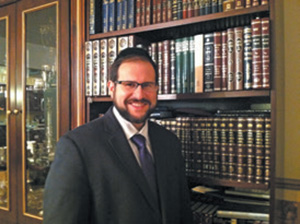
For a period during my youth, my parents arranged for my sister Ahuva and me to take ice-skating lessons. What I remember the most is the instructor telling us to always lean forward while skating, so if (when) we fall, we fall forward, instead of on our backs. I do remember falling a lot. I didn’t quite make the U.S. Olympics team for skating, but it was fun.
I was thinking about that class a few years ago, when we signed up our son Shalom to play in an ice-hockey league. The program was for a series of Sundays, from early autumn until the middle of the winter. The first session was on a warm 80-degree Sunday in late September.
There is no sport that requires as much gear as ice-hockey, and we arrived sufficiently early in order to help Shalom put on all of his necessary gear. We helped him put on his chest protector, elbow and knee protectors, helmet, jersey and, of course, his skates. Then he skated onto the ice with his hockey stick.
I stood behind the glass watching proudly, amazed that we had actually figured out (with some help from other parents and players) how to put on all of his gear. Another father was also watching, and we made some small talk. As he looked out on the ice, he turned to me and snickered, “Look at that kid in the shorts. I guess his parents didn’t realize that it’s cold on the ice!” I replied that some people just don’t think about these things. How silly that the poor boy’s parents didn’t think that even though it was hot outside, the ice still has to be below freezing! Then I politely excused myself and ran to call Chani, and told her that our son’s parents had neglected to bring him adequate clothing for the ice.
Chani proceeded to drive over to my parents’ house, which was closer than our house, and rummaged through closets until she found a pair of sweatpants and a sweater. When she brought the clothes to me, I nonchalantly called Shalom off the ice. When he skated off and I handed him the clothing, he was most grateful. He said that he had felt really cold on the ice, and was wondering why he was the only kid skating in shorts.
This week, we celebrated Rosh Chodesh Kislev, which means that Chanukah is on the horizon. The local kosher supermarkets and sefarim stores already have Chanukah items on display. Many have already begun to make plans for the upcoming holiday, including family parties and communal get-togethers. As the coming weeks rush by, demand and prices for oil will sharply rise, and doughnuts will be on display everywhere.
In our society of blessed bounty, we do not lack any of the beautiful ancient physical customs that comprise the holiday of Chanukah. But for one who really seeks to elevate his neshama, to glean the true meaning and essence of Chanukah, the weeks before are an opportunity to mentally and spiritually prepare ourselves to understand and appreciate the eternal message of Chanukah.
The sad reality is that many show up on the first night of Chanukah with beautiful menorahs prepared, the smell of latkes and doughnuts in the air, and presents wrapped off to the side, but content with the same callow understanding of the holiday that they have maintained since their youth. It’s analogous to one showing up on the ice without the gear he needs to play the game. [The better analogy would be to a player coming onto ice with a jersey and helmet but no stick or skates. Thankfully, our situation wasn’t that bad.]
There are a plethora of beautiful sefarim and lectures (many free online) in Hebrew, English and many other languages that help foster a far deeper appreciation of Chanukah and the emotionally penetrating lessons and message of the candles. After a few weeks of proper spiritual preparation, the Hallel recited throughout the eight days will be a far more elevating experience.
Before we have the opportunity to wish each other Happy Chanukah, we should wish each other a meaningful and elevating pre-Chanukah.
By Rabbi Dani Staum
Rabbi Dani Staum, LMSW, is the rabbi of Kehillat New Hempstead as well as a rebbe and the guidance counselor at Heichal HaTorah in Teaneck, New Jersey, principal at Mesivta Ohr Naftoli of New Windsor and a division head at camp Dora Golding. He also presents parenting classes based on the acclaimed Love and Logic methods. His email address is [email protected]. His website is: www.stamtorah.info.













